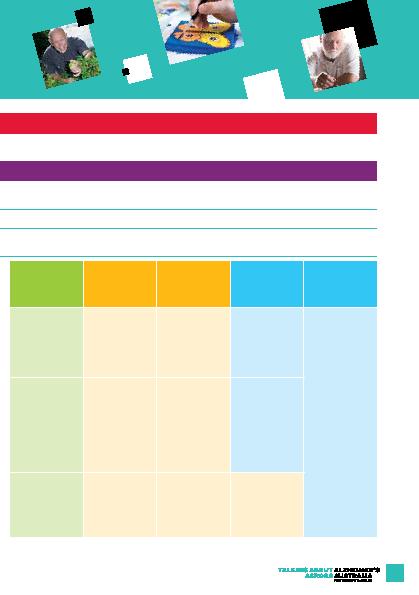
Please assemble at the Registration Desk at 1045
chair: chris Hatherly
chair: Mary Davies
chair: tim Wallace
chair: Patricia Baines
chair: annette Davey
chair: victoria Beedle
chair: christabel alliston
chair: lynne Hedley
service
chair: linda graham
chancellor 6
charles Hudson
risky business
sally osborne
through collaboration:
Addressing the needs of
people with disability
Mary Bills
a successful art and
creativity program
Jacqueline lewis
living with younger
onset dementia The
experiences of young
people
Karen Hutchinson
`Doing things together'
Peter Mccloskey
Marilyn cassin
people living with dementia
come to acute care?
Helen courtney-Pratt
colouring of future in
dementia education
for multidisciplinary
professionals: A
transformation in practice
Basseer Jeeawody
world of people living with
dementia
anne Kelly
implementing a cognitive
rehabilitation program
impairment through a
rehabilitation model:
Lessons learned from
Alzheimer's Australia
Tasmania
sarah elder
anna Wolf
sinead Paine
catherine Meredith
health an easy choice
suha ali
caring for a person with
dementia
Judi Parson
through education
Karen constant
Jennifer Henderson
multi-sensory
stimulation can engage
people with severe and
very severe dementia
chris Materne
is not enough: Exploring
the need for assessment
of sensory preferences
of people liviving with
dementia
louise Jones
Stimulating memory
through taste
Helen Mitchell
and Training Network
Forging ahead to meet the
needs of metropolitan, rural
and remote clinicians by
taking a positive approach
to care of the person
with dementia through an
eLearning application
Kathryn De souza
worldwide: Bridging the
gap
carolyn King
Therapy A counselling
pilot program for carers of
people with dementia
Denise Wissmann
liz ronsisvalle
The spectrum of clinical
presentations
Michael Woodward
Onset Dementia
Support Group
(Facebook style)
Denise craig
Drumming for self
expression
narelle naismith
Health Afternoon:
Planning a brain health
information session for
an Aboriginal community
nicole o'connor
Again'': Exploring the
clinical use of iPads in
music therapy programs in
dementia care
alexandra Morse
of acute hospitalisation of
people with dementia?
Findings from the Hospital
Dementia Services Project
Brian Draper
Service: An innovative
approach to quality
dementia care
Karen Malone
journey: Across the
trajectory of the illness
Hazel Bucher